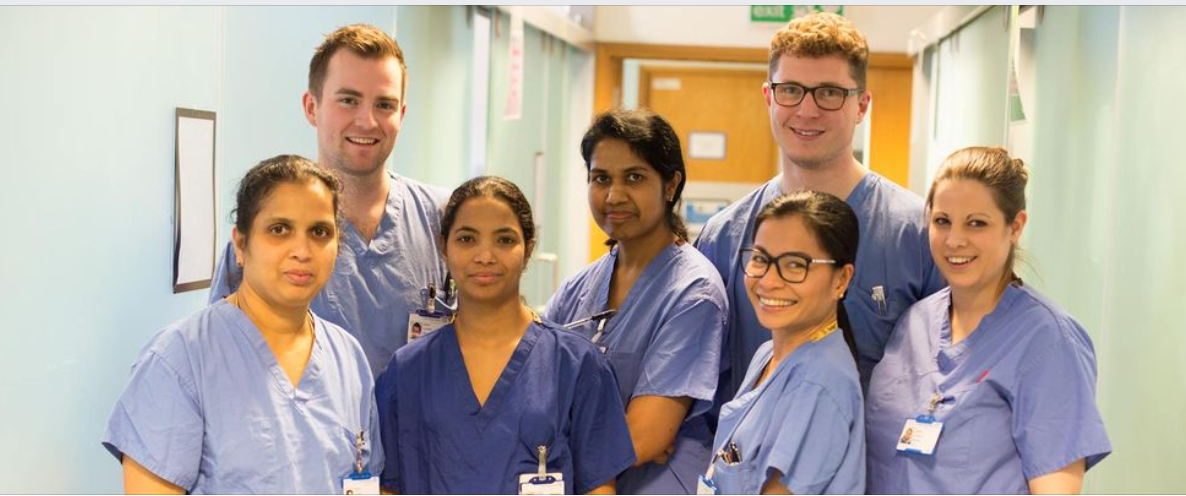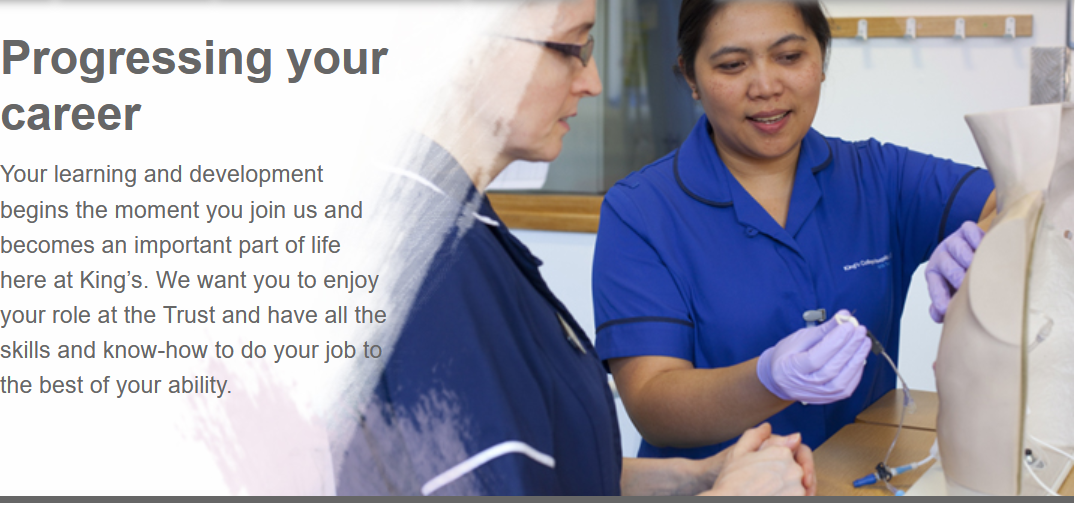King’s College Hospital NHS Foundation Trust
King’s College Hospital is a major trauma centre in Denmark Hill, Camberwell in the London Borough of Lambeth. It is managed by King’s College Hospital NHS Foundation Trust. It serves an inner city population of 700,000 in the London boroughs of Southwark and Lambeth, but also serves as a tertiary referral centre in certain specialties to millions of people in southern England.
We are one of London’s largest and busiest teaching hospitals, with a strong profile of local services.
Our specialist services are available to patients across a wider catchment area, providing nationally and internationally recognised work in liver disease and transplantation, neurosciences, haemato-oncology and foetal medicine.
It is a large teaching hospital and is, with Guy’s Hospital and St. Thomas’ Hospital, the location of King’s College London School of Medicine and one of the institutions that comprise the King’s Health Partners, an academic health science centre.

Specialist services at King’s
At King’s, we provide specialist services for which we are known nationally and internationally. A number of these are summarized below. We have expert spokespeople in all these areas and we can also help journalists looking for powerful and inspirational stories involving our patients.
Liver transplants
King’s has the largest liver transplant centre in Europe. We have pioneered new techniques in liver transplantation, including the splitting of donated livers to benefit more than one patient. We are an international centre for the diagnosis and treatment of viral hepatitis. We are also home to the largest children’s liver service in the UK.
In summer 2010, the liver unit featured in Channel 4 series “The Hospital”, which looked at the impact young people’s lifestyles are having on the NHS. In January 2011, our Hepatitis C service was also the subject of a BBC Radio 4 Case Notes programme presented by GP Dr Mark Porter.
Stroke (brain attacks) and Major Trauma Centre status
We are home to one of London’s three Major Trauma Centres (MTCs), meaning patients with life-threatening injuries are transferred to us by paramedics or air ambulance for specialist treatment. Our Emergency Department (ED) treats more than 120,000 patients every year, and is the subject of Channel 4’s 14-part primetime series “24 Hours in A&E”, which features our staff and the patients they treat. King’s also has a Hyper Acute Stroke Unit. People who have a stroke (brain attack) require urgent treatment as well as clot-busting drugs to help restore blood flow. Our Stroke Unit was recently ranked by the Royal College of Physicians as one of the top five in the country.
Heart disease and heart attacks
King’s is a centre of excellence for primary angioplasty. This is a technique whereby a stent (small metal tube) is used to open up arteries which have narrowed or become blocked. We recently became one of the first hospitals in London to use a biodegradable heart stent, which dissolves after the vessel has healed and no longer needs support.
In tandem with our cardiac colleagues at Guy’s and St Thomas’ NHS Foundation Trust, King’s also runs the largest aortic valve replacement programme in the UK. The programme – which avoids the need for open heart surgery – has the potential to help thousands of people with artificial heart valves deemed too high risk for repeat open heart surgery.
Looking after children before they are born
The Harris Birthright Unit at King’s is one of the largest fetal medicine units of its kind in the world, seeing 15,000 women and their unborn babies each year. Led by Professor Kypros Nicolaides, the unit provides specialist testing and treatment for babies with abnormalities in the womb, including Down’s Syndrome, heart defects and twin-to-twin transfusion syndrome (TTTS).
The unit was the focus of a 2009 Channel 4 documentary, Emergency in the Womb. More recently, it featured in a National Geographic documentary called In the Womb: Miracle Babies, which was broadcast in February 2011.
Brain surgery
We have 14 consultant neurosurgeons at King’s, helping patients who have suffered major head trauma (for example, in road traffic accidents), brain hemorrhages, as well as brain and spinal tumors. King’s also provides specialist services for patients with epilepsy, as well as movement disorders including Parkinson’s and dystonia.
In 2009, King’s neurosurgeon Nick Thomas performed a pituitary tumor removal live on Channel 4 as part of The Operation: Surgery Live series. More recently, King’s neurosurgeons have featured in the media for performing deep brain stimulation on a King’s patient with dystonia aged only four years old, as well as for the removal of a tumor from a patient’s optic nerve, which was taken out via her nose. This was the first time the operation had been carried out in the UK.
Blood cancers
King’s is a major centre for the treatment of leukemias, including rare forms of the disease. We run the largest bone marrow transplant service in the UK, carrying out more than 150 transplants every year. This includes bone marrow donated anonymously and parent-to-child bone marrow transplants.
We are also home to the Kingscord programme, which involves women giving birth at the Trust donating blood rich in stem cells from their umbilical cord and placenta for use in transplants. The programme at King’s is run in partnership with the Anthony Nolan Trust.
As a result of the integration we operate as one Trust across many sites. We are transforming King’s into a fundamentally new kind of Trust built around patient need, offering all our patients – local, national and international – the highest quality of care. We are delivering this as part of a joined-up and well-managed healthcare system, built in partnership with GPs, commissioners and other healthcare providers.
 Visit Official Website
Visit Official Website
